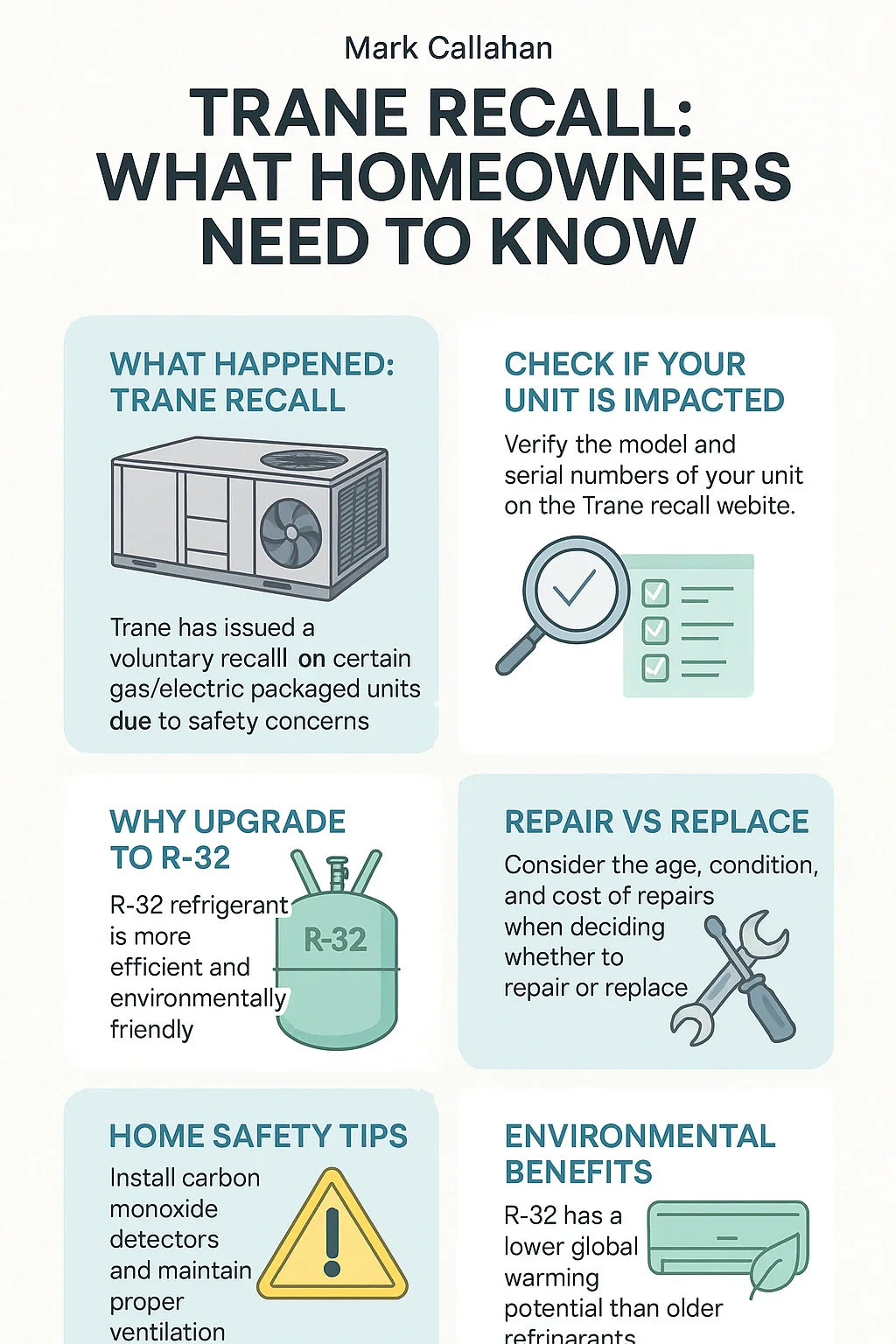Introduction: A Wake-Up Call for Homeowners 🛎️
Trane recently issued a voluntary recall on select gas/electric packaged units due to potential fire hazards, sending a clear message: safety and refrigerant transitions matter more than ever.
If you own or plan to replace your heating and cooling system, this event underlines why homeowners should consider R-32 air conditioner and gas heater systems, which are more efficient, environmentally responsible, and often safer when managed correctly.
This in-depth guide by Mark Callahan will:
-
Break down what the Trane recall means.
-
Help you check if your unit is impacted.
-
Guide you on safe next steps.
-
Explain how this ties into the refrigerant shift to R-32 systems.
-
Provide actionable tips for upgrading safely.
What Happened? Understanding the Trane Recall 🔥
On June 19, 2024, Trane Technologies recalled about 55,000 Trane and American Standard gas/electric packaged units due to a fire hazard linked to a gas leak caused by the reduction of torque in a field-installed gas pipe connection fitting.
Source: ACHR News
The key models impacted include select packaged units manufactured between 2021–2023.
Why is this a big deal? ⚠️
-
Natural gas leaks can cause fires.
-
A recall indicates systemic issues in quality checks or design compatibility.
-
This is a reminder that older or improperly maintained systems can pose real risks.
You can check your unit’s status on Trane’s recall lookup page:
What to Do if Your Trane Unit is Recalled 🛠️
1️⃣ Check your model and serial number
Locate your unit’s nameplate (often on the exterior panel) and note your model and serial number.
2️⃣ Visit Trane’s recall page
Input your serial number to confirm if your unit is impacted.
3️⃣ Stop using the unit if you smell gas
If you smell gas:
-
Turn off the system.
-
Shut off the gas supply.
-
Leave your home immediately.
-
Contact your gas utility and Trane’s recall hotline.
4️⃣ Schedule a free repair
Trane is offering free repairs through authorized technicians to correct the fitting torque and inspect for potential leaks.
5️⃣ Inspect your entire HVAC system
Use this opportunity to review:
-
Age of your system
-
Overall efficiency
-
Refrigerant type (R-22, R-410A, or outdated variants)
-
Future upgrade opportunities
Why the Refrigerant Matters: R-32 vs. Older Refrigerants 🌍
Many existing packaged units, including those recalled, may use R-410A refrigerant, which has a higher GWP (Global Warming Potential) compared to R-32 refrigerant.
R-32 Benefits:
✅ Reduced GWP (675 vs. 2088 for R-410A) ✅ Better energy efficiency ✅ Easier to recycle and manage ✅ Faster system cooling ✅ Future-ready for refrigerant regulations
Learn more:
Why Homeowners Should Consider R-32 Systems Now 🏠
With refrigerant regulations tightening in 2025 and beyond, many homeowners are choosing to upgrade to R-32 systems.
Explore the R-32 collection for residential air conditioners and gas heaters here:
Benefits for homeowners:
-
Lower utility bills through higher efficiency.
-
Future compliance with refrigerant regulations.
-
Potential for rebates and tax credits for energy-efficient systems.
-
Quieter operation and compact design.
Comparing Options: Repair vs. Replace 🤔
| Factor | Repair (Trane Recall) | Replace with R-32 System |
|---|---|---|
| Cost | Free repair | Investment, may qualify for tax credits |
| Safety | Resolves fitting leak | Eliminates future refrigerant compliance issues |
| Efficiency | No upgrade | Higher SEER2, lower GWP |
| Long-Term | Short-term fix | Long-term savings and compliance |
Is Now the Right Time to Upgrade? 🕒
If your system:
-
Is 10+ years old
-
Uses R-410A or R-22 refrigerant
-
Requires frequent repairs
-
Has high utility costs
…it may be financially smarter to replace your system with an R-32 unit rather than continue repairs, even if your unit qualifies for the Trane recall repair.
Safety and Maintenance Tips for Homeowners 🛡️
✅ Schedule annual maintenance checks for gas lines and refrigerant leaks. ✅ Install a carbon monoxide detector near your system. ✅ Clean filters regularly for system efficiency. ✅ Inspect for refrigerant leaks if cooling feels insufficient. ✅ Keep your outdoor unit clear of debris.
For advanced tips:
Environmental Responsibility: Your Role 🌱
By upgrading to R-32 systems, homeowners contribute to:
-
Lower greenhouse gas emissions.
-
Reduced environmental impact of refrigerants.
-
Supporting sustainability goals in residential heating and cooling.
Learn how refrigerants impact climate:
Conclusion: Turning a Recall into an Opportunity 🌟
While the Trane recall is a serious safety issue, it’s also a chance to review your home’s heating and cooling future.
Consider: ✅ Checking your unit now. ✅ Scheduling repairs if impacted. ✅ Planning an upgrade to R-32 systems for efficiency, safety, and compliance. ✅ Using this event to take control of your energy future while protecting your family.
For the best upgrade guidance and options:
Written by Mark Callahan, HVAC Specialist, Energy Efficiency Advocate, and Homeowner Resource Contributor for The Furnace Outlet.







